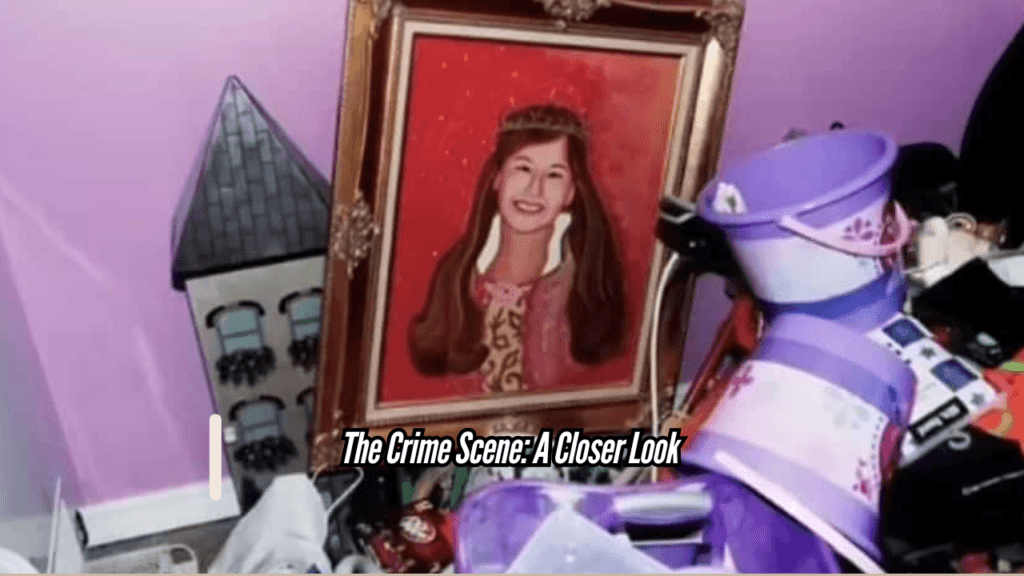What drives someone to commit the unthinkable? The shocking tale of Gypsy Rose Blanchard and the murder of her mother, Dee Dee Blanchard, captured global attention.. While crime scene photos provide chilling insight into the aftermath, they also unveil the complex layers of abuse, manipulation, and survival. This article takes you through the dark truths surrounding the infamous case, shedding light on the events leading up to the tragedy and its repercussions.
The Backstory: Who Is Gypsy Rose Blanchard?

Gypsy Rose Blanchard’s life seemed like a tale of resilience—a young girl battling chronic illnesses under the devoted care of her mother, Dee Dee Blanchard. However, underneath the surface was a tangled web of lies and deception.. Dee Dee was afflicted by Munchausen syndrome by proxy, a mental disorder where a caregiver fabricates or induces illnesses in someone under their care to gain attention or sympathy.
Gypsy endured countless unnecessary medical procedures, was confined to a wheelchair, and was even forced to use a feeding tube. Her mother controlled every aspect of her life, perpetuating the illusion of a terminally ill child. This abuse left Gypsy with little agency or understanding of the outside world.
Also read this: Selena Gomez’s Engagement Shocker: Fans Can’t Believe It!
The Crime That Shocked the Nation
On June 14, 2015, the facade of the Blanchard home shattered. Dee Dee Blanchard was found brutally murdered in her bedroom. The prime suspects? Gypsy Rose and her online partner, Nicholas Godejohn. The pair had plotted the crime for months, with Nicholas traveling to Gypsy’s home to carry out the act while she hid in the bathroom.
The murder was a desperate escape from years of torment. Gypsy later revealed in court and media interviews that she saw no other way out. Nicholas, who suffered from his own mental health issues, was manipulated into aiding her. The murder was not just a crime but a cry for freedom from a lifetime of abuse.
The Crime Scene: A Closer Look

While the crime scene photos themselves are not publicly available, their descriptions paint a harrowing picture. Investigators reported Dee Dee’s lifeless body in her bed, surrounded by blood evidence that indicated a violent struggle. The room, once a prison of lies, became the site of ultimate justice—and tragedy.
Forensic evidence was crucial in uncovering the truth behind the story. The blood patterns, knife wounds, and Gypsy’s messages to Nicholas on social media created a timeline of events that left little doubt about their culpability. These photos, though chilling, underscored the abuse Gypsy had endured and the extreme measures she took to escape.
Public Reaction and Media Frenzy
The case became a media sensation, drawing attention from true crime enthusiasts, psychologists, and human rights advocates. Documentaries like Mommy Dead and Dearest and dramatized series like The Act brought the story to an even wider audience. Public opinion was polarized: some sympathized with Gypsy, viewing her as a victim of circumstance, while others criticized her for resorting to violence.
The case also ignited debates about the ethics of true crime storytelling. Was Gypsy’s story being exploited for entertainment, or was it raising awareness about the horrors of Munchausen by proxy and domestic abuse?
Also read this: Kelly Bates’ Bold Plea: Don’t Take Anger Out on NBC 10
Where Is Gypsy Rose Now?
Today, Gypsy Rose is serving her sentence for second-degree murder. However, her time in prison has been a period of personal growth and reflection. Reports suggest she has been thriving in a structured environment, free from her mother’s manipulative control. Gypsy has even expressed remorse for the crime while maintaining that it was her only way out.
She’s also become a symbol of resilience for many. Despite her circumstances, Gypsy is working toward building a life beyond the shadow of her past. Her story serves as a cautionary tale of unchecked abuse and the devastating consequences it can have.
Ethical Considerations: Should Crime Scene Photos Be Public?

The public fascination with crime scene photos raises important ethical questions. While such images can provide insights into criminal investigations, they also risk sensationalizing violence and disrespecting victims. In the case of Gypsy Rose, the focus should remain on understanding the systemic failures that allowed Dee Dee’s abuse to persist rather than on the graphic details of the crime itself.
Related Cases of Abuse and Survival
Gypsy’s story is not an isolated incident. Cases of Munchausen by proxy and domestic abuse often go unnoticed, leaving victims trapped in cycles of trauma. By examining these stories, society can better understand the signs of abuse and advocate for stronger protections for vulnerable individuals.
Conclusion
The tragic tale of Gypsy Rose Blanchard and the crime scene photos that encapsulate it serve as a stark reminder of the consequences of unchecked abuse. While Dee Dee’s actions were heinous, they were met with an equally tragic end, driven by a desperate bid for freedom. Gypsy’s story compels us to reflect on the importance of intervention, understanding, and empathy for victims of abuse.
As we continue to unravel the complexities of this case, one truth remains clear: the scars of abuse run deep, and breaking free often comes at an unimaginable cost.
FAQs:
Munchausen syndrome by proxy is a mental health disorder in which a caregiver, typically a parent, exaggerates or fabricates illnesses in their child to gain attention and sympathy. In Gypsy Rose Blanchard’s case, her mother, Dee Dee, falsely portrayed Gypsy as severely ill to manipulate others and receive care and support.
Yes, Gypsy Rose has expressed remorse for killing her mother, Dee Dee. While she maintains that the crime was her only way out of years of abuse, she has acknowledged the pain caused by her actions and has worked toward personal growth during her time in prison.
Currently serving a prison sentence, Gypsy Rose is reportedly adjusting well to life behind bars. She has found stability and personal growth, despite the difficult circumstances. Gypsy has worked on understanding her past and is focused on rebuilding her life, looking forward to a future free from manipulation and control.